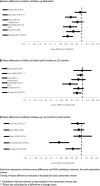Supported self-management for people with type 2 diabetes: a meta-review of quantitative systematic reviews
- PMID: 30552277
- PMCID: PMC6303627
- DOI: 10.1136/bmjopen-2018-024262
Supported self-management for people with type 2 diabetes: a meta-review of quantitative systematic reviews
Abstract
Objectives: Self-management support aims to give people with chronic disease confidence to actively manage their disease, in partnership with their healthcare provider. A meta-review can inform policy-makers and healthcare managers about the effectiveness of self-management support strategies for people with type 2 diabetes, and which interventions work best and for whom.
Design: A meta-review of systematic reviews of randomised controlled trials (RCTs) was performed adapting Cochrane methodology.
Setting and participants: Eight databases were searched for systematic reviews of RCTs from January 1993 to October 2016, with a pre-publication update in April 2017. Forward citation was performed on included reviews in Institute for Scientific Information (ISI) Proceedings. We extracted data and assessed quality with the Revised-Assessment of Multiple Systematic Reviews (R-AMSTAR).
Primary and secondary outcome measures: Glycaemic control as measured by glycated haemoglobin (HbA1c) was the primary outcome. Body mass Index, lipid profiles, blood pressure and quality of life scoring were secondary outcomes. Meta-analyses reporting HbA1c were summarised in meta-forest plots; other outcomes were synthesised narratively.
Results: 41 systematic reviews incorporating data from 459 unique RCTs in diverse socio-economic and ethnic communities across 33 countries were included. R-AMSTAR quality score ranged from 20 to 42 (maximum 44). Apart from one outlier, the majority of reviews found an HbA1c improvement between 0.2% and 0.6% (2.2-6.5 mmol/mol) at 6 months post-intervention, but attenuated at 12 and 24 months. Impact on secondary outcomes was inconsistent and generally non-significant. Diverse self-management support strategies were employed; no single approach appeared optimally effective (or ineffective). Effective programmes tended to be multi-component and provide adequate contact time (>10 hours). Technology-facilitated self-management support showed a similar impact as traditional approaches (HbA1c MD -0.21% to -0.6%).
Conclusions: Self-management interventions using a range of approaches improve short-term glycaemic control in people with type 2 diabetes including culturally diverse populations. These findings can inform researchers, policy-makers and healthcare professionals re-evaluating the provision of self-management support in routine care. Further research should consider implementation and sustainability.
Keywords: Supported Self-management; health policy; meta-review; primary care; quality In health care.
© Author(s) (or their employer(s)) 2018. Re-use permitted under CC BY. Published by BMJ.
Conflict of interest statement
Competing interests: None declared.
Figures



References
-
- International Diabetes Federation. IDF Diabetes Atlas. 7th International Diabetes Federation [article online, 2015. (Accessed 16 May 2018).
-
- Healthcare Commission. Improving services for people with diabetes [article online]. 2007. http://www.yearofcare.co.uk/sites/default/files/pdfs/Managing_diabetes.pdf (Accessed 16 May 2018).
-
- National Academies Press (US). : Adams K, Greiner AC, Corrigan JM, 1st Annual crossing the quality chasm summit: a focus on communities. Washington (DC: National Academies Press (US), 2004. - PubMed
-
- de Silva D. Helping people help themselves: A review of the evidence considering whether it is worthwhile to support self-management. 2011. http://www.health.org.uk/sites/health/files/HelpingPeopleHelpThemselves.pdf (Accessed 14 Jul 2017).
Publication types
MeSH terms
Substances
Grants and funding
LinkOut - more resources
Full Text Sources
Medical
Miscellaneous
